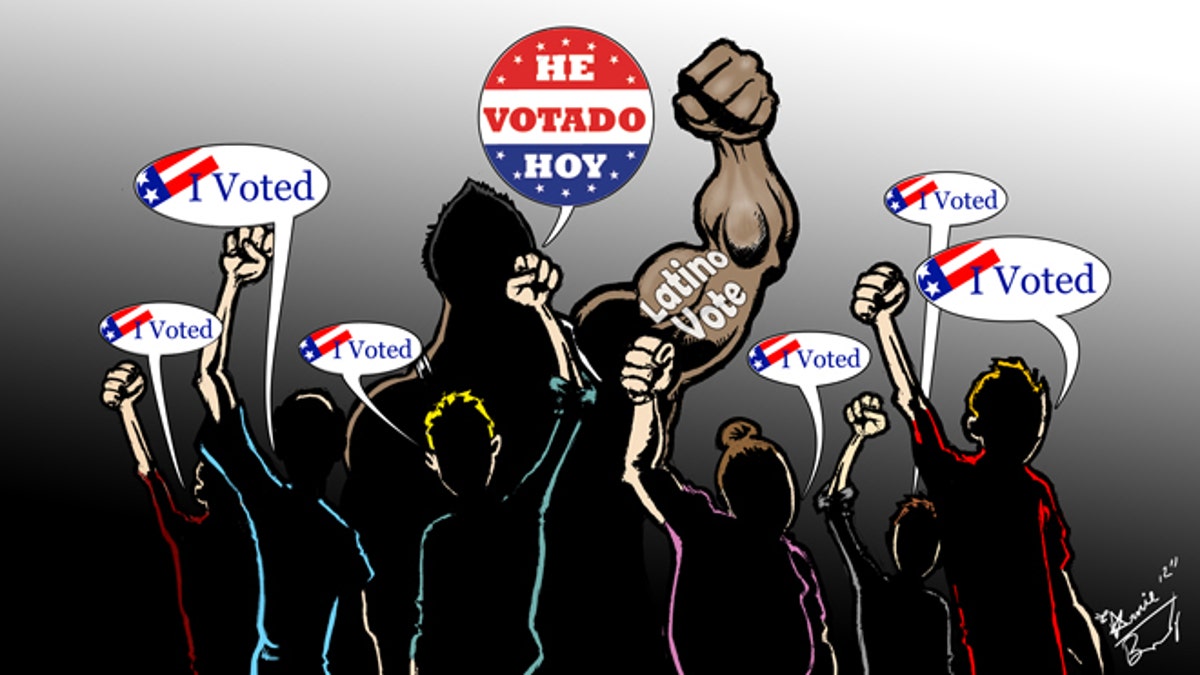
(Arnie Bermudez)
A day after President Barack Obama won re-election in 2012, headlines declared 'record' Latino voter turnout at the polls was a main reason. The era of Hispanic voter apathy had ended alongside Mitt Romney's campaign and any future hopes of the Republican party for years to come.
Obama had just won 71 percent of the Hispanic vote and Romney garnered a measly 27 percent.
A Fox News Latino article made the point that Obama's victory was proof that the "Sleeping Latino Giant Is Wide Awake," and the New York Times concluded that Latinos had secured their position as a "force in American politics with the power to move national elections."
But a new report released by the U.S. Census Bureau Wednesday shows that the Latino voter turnout in 2012, 48 percent, was actually proportionately lower, by nearly 2 percentage points, than in 2008 at 49.9 percent.
While the number of Latino voters rose by about 1.4 million in 2012, to a record 11.2 million, the Census report attributed the increase to population growth — a mathematical certainty for the nation's fastest growing demographic group.
In fact, the number of Latino voters who chose not to vote in the presidential election increased even more – by 2.3 million – from 9.8 million in 2008 to 12.1 million in 2012, according to the report.
The new census numbers also undermine a national narrative pushed by Latino leaders and national Latino advocacy groups that hailed 2012 as the beginning of a new era of engaged involved Hispanic electorate.
Meanwhile, the data also shows that for the first time ever America's black electorate voted at higher rates than whites in 2012.
While just 48 percent of Hispanics voted in 2012, 66.2 percent of eligible black voters cast their ballots, up from 64.7 percent in 2008 compared with non-Hispanic white turnout of 64.1 percent, which fell from 66.1 percent four years earlier.
The data underscore how turnout plays an important role in elections for both whites and blacks, who will remain the two largest racial groups of eligible voters for the next decade. While Hispanics are now the fast-growing demographic group, they currently make up a smaller share of eligible voters because many are children and non-citizens, limiting their electoral impact for the immediate future.
"Blacks have been voting at higher rates, and the Hispanic and Asian populations are growing rapidly, yielding a more diverse electorate," said Thom File, a census sociologist who wrote the voting analysis. "Over the last five presidential elections, the share of voters who were racial or ethnic minorities rose from just over 1 in 6 in 1996 to more than 1 in 4 in 2012."
In a statement released by the National Association of Latino Elected Officials, the organization highlighted the increased share of Latino voters as a whole and pointed out that Latino voter turnout had its greatest impact in the battleground states that ultimately determine the presidency.
“We are pleased to see the latest Census analysis confirm what we have known all along—that the Latino electorate’s participation in the 2012 election reached historic heights," the press release said. "“Nationwide, the Latino share of the vote rose to 8.4 percent in 2012, compared to 7.4 percent in the 2008 election. In battleground states like Colorado, Florida and Nevada, the Latino electorate was particularly decisive, providing the margin of victory in a number of key municipal, state and federal elections."
Paul Taylor, executive vice president of the Pew Research Center, indicated the economy will be an important factor in future elections, noting that Hispanics and young people were among the hardest hit during the high unemployment years of 2008-2012.
"Given what we know about the youth bulge in the population, Millennials and Hispanics will become ever more important voting blocs in upcoming presidential elections," Taylor said. "But in 2012, both groups left a lot of votes on the table."
The Associated Press contributed to this story.
Follow us on twitter.com/foxnewslatino
Like us at facebook.com/foxnewslatino




